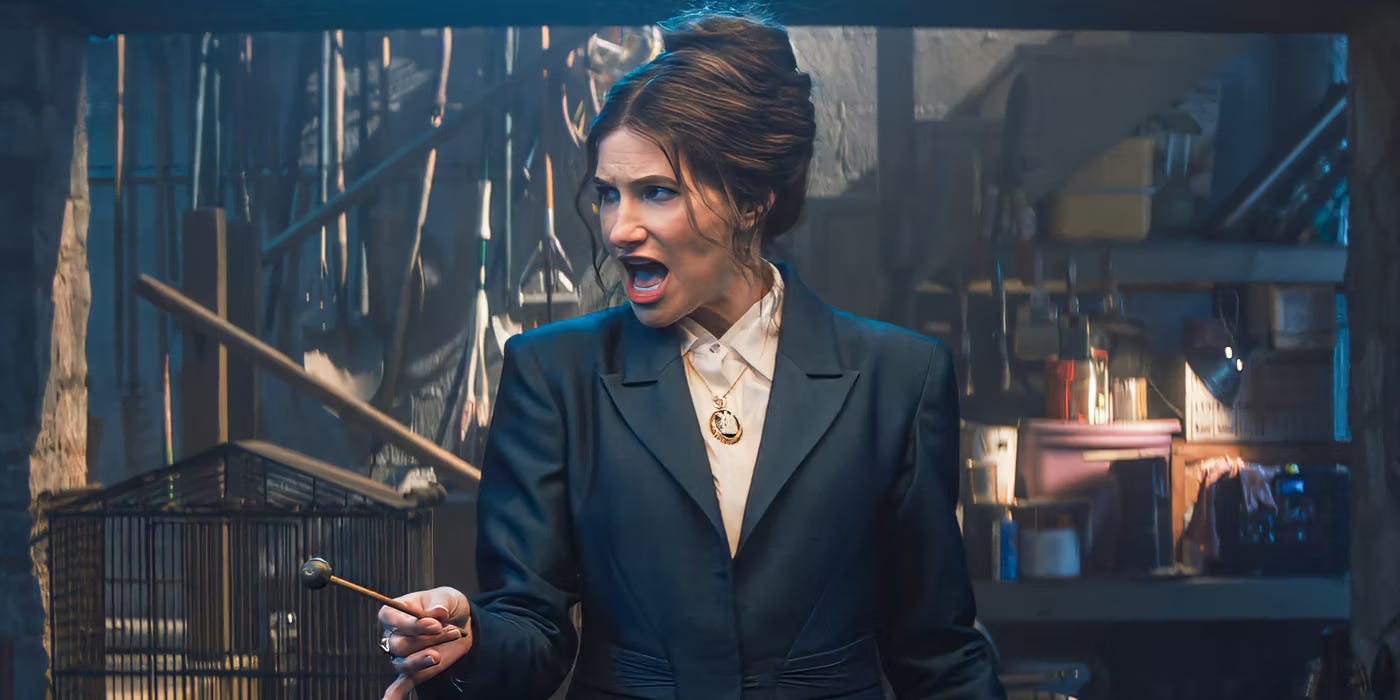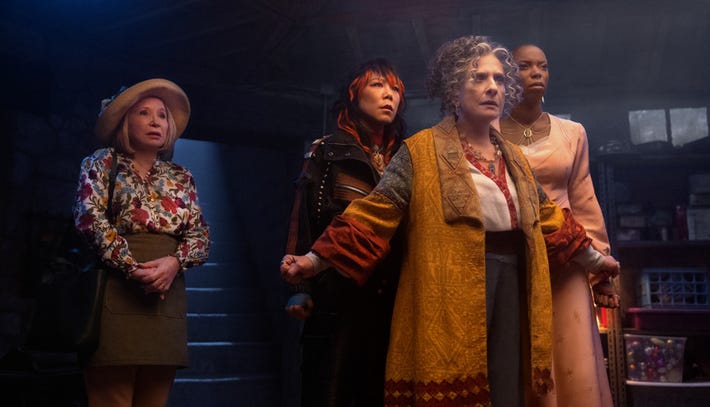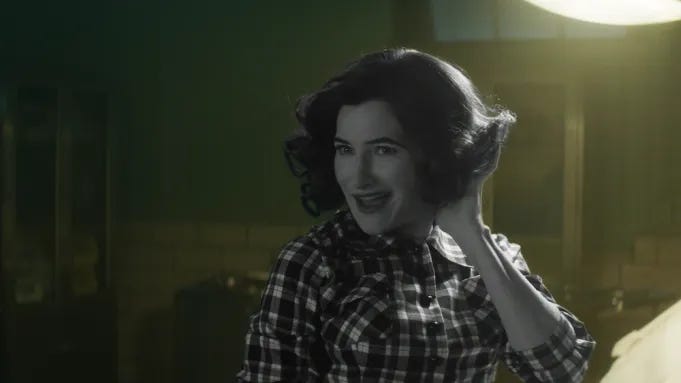Agatha All Along runs amok, amok, amok in its premiere.
In which I air some grievances about Episode 1 and praise Episode 2.
The Short Take:
Skip ahead to Episode 2 if you’re on the fence. The first episode is a bit unsteady in its writing and, unsurprisingly, strains to create continuity with past Marvel properties, but once the second episode settles into a witchier milieu, I was sold. Here’s hoping the series can commit to what it’s promised and not get distracted.
[SPOILER WARNING: It was spoilery all along….This review will contain details from the two-episode premiere of Agatha All Along. There is also a related spoiler for Doctor Strange in The Multiverse of Madness (2022) that I will need to discuss.]
Image Credit: Collider
The Long Take:
If you have a coven of witches, joined in a circle, singing a haunting melody, you have my attention.
I’ve written about my affinity for witches before, so it should come as no surprise that once Agatha went full witch mode, with musical incantations, esoteric rules about magic, and what appear to be Marvel’s rendition of the Nazgul from The Lord of the Rings, I was leaning in. Hocus Pocus was a very formative film for me. It came out in 1993, when I was 10 year old. I remember the campy antics of its central trio taught me that spooky stories don’t have to be scary — they can be silly and fun. The coven that Agatha assembles by the end of this two-episode premiere reminds me a lot of the Sanderson sisters. Sometimes powerful, sometimes ineffectual, and with more than enough sassy theatrics to spare. (Incidentally, I’m shocked to find out that while 10-year-old me was having a ball, critics were panning this movie left and right. Oof.)
Oh, and do I love a good team of dysfunctional misfits and rejects. That formula, of course, has certainly worked for Marvel before in The Guardians of the Galaxy. The odd couple group dynamic of Guardians but make it spooky and mystical? Count me in.
Image Credit: Forbes
I just wish it hadn’t taken so long — a full episode and some change — to get to that point.
Kathryn Hahn’s hamminess is a precision weapon that needs to be deployed properly; it cannot be sprayed haphazardly around like bug repellant. And I would say that WandaVision (2021) aimed and fired accurately. Hahn was in just enough of the episodes and stole just enough of the show to immediately become a fan favorite. Her wacky cackling and campy winking never overstayed its welcome, and established mystery while injecting a dose of fun into what was otherwise a surreal yet very somber story about Wanda’s grief after the events of Avengers: Infinity War (2018) and Avengers: Endgame (2019).
In the first episode of Marvel’s new spin-off series, Agatha All Along, however, what previously made Kathryn Hahn so undeniable in WandaVision is mismanaged like an ion cannon overheating and indiscriminately zapping everyone in the room. I admit, I was tickled that Agatha was trapped as Agnes inside a prestige detective drama; I was a huge fan of HBO’s Mare of Easttown (2021) starring Kate Winslet and immediately recognized that Agnes’ disheveled look, nasally accent, and disregard for the rules was a direct homage to Marianne “Mare” Sheehan. Yet, I didn’t quite know what to make of the tone with which Agatha/Agnes inhabited this new world. The writing at times felt like pastiche — a sincere imitation of the ornery cop with no personal life genre — but then would quickly shift into SNL sketchy comedy level parody. And did we really need that when we already have an actual SNL bit about Mare of Easttown?
I did laugh, but without knowing exactly what I was laughing at — Agatha stuck inside another TV genre or the TV genre itself? I felt unmoored, and not in a good way.
I think about genre a lot. It’s a cornerstone of the class that I teach, which asks students to nimbly shift their tone, style, and structure for a different situation and different type of writing in each assignment. And something I inevitably provide feedback on is how their choices may or may not align with the conventions of a particular genre. You can’t really crack jokes in an academic paper and you can’t be too dry in a Buzzfeed listicle. And, keeping that in mind, I think that the genres that informed WandaVision naturally fit Agatha’s kitschy glow. From what I recall, all of the genres or shows that would act as a filter in any given episode of WandaVision — from the broader gesture to black and white sitcoms like but not exactly like I Love Lucy and The Dick Van Dyke Show, to hyper-specific homages to singular shows like Malcolm in the Middle — were all comedies. There was an intrinsic alignment of conventions there.
Hard-boiled crime drama? Less so.
Image Credit: Collider
Now you could debate whether or not WandaVision is pastiche or parody, but I think the alignment of vintage comedy with over-the-top comedic performances at least makes that debate possible because it’s unclear if the show’s cheekiness is a part of the imitation. Here, with a more serious genre, the chasm between taking the genre seriously and offering a campy take on the genre is much wider. And so if the bit is not unequivocally one or the other, it fails to land in the right way. I couldn’t quite tell if it was the lines as written or the extreme readings of them that were bigger contributors to this, but I’ll say that I would have much preferred Agatha play her lady detective role as self-serious pastiche. Kathryn Hahn giving a straight and more subdued dramatic performance, as if she’s gunning for an Emmy, only to break loose into the fabulous diva we know and love, would have been much funnier.
Why is this happening? Why does this series feel the need to open with a bombastic parody of Mare of Easttown? I almost hesitate to answer that question because doing so will inevitably trot out the same tired arguments about the middling efforts of the late stage MCU. That connectivity and continuity come at the expense of focused storytelling. Without the occasion to reference its progenitor, Agatha All Along has no need to engage in any genre play. Based on Episode 2, it does not appear that Wanda’s hex will have any bearing on the plot of the show, which is clearly built around The Witches’ Road quest. The dramatic reveal of Wanda’s name on the mysterious library card is designed to send shivers down our spine and remind us of that other series we really liked.
The ultimate goal of Episode 1 seems to be to reorient us to Wanda’s story, not necessarily Agatha’s. At the end of WandaVision, Wanda takes back her magic, deprives Agatha of hers, and re-traps Agatha as Agnes in the hex’s TV-inspired alternate reality. Agatha is able to escape at the start of Agatha All Along because Wanda dies at the end of Doctor Strange in The Multiverse of Madness, thus breaking the spell. If you’ve read my review of that film, you know how I felt about being reminded of this fact.
But did we need to remember all of that to enjoy this show? That is the question I keep mulling over.
Okay, fine. Watching Agatha peel all the layers of Agnes from WandaVision off like a snake shedding its skin over and over again did bring me joy. As I’ve said before, I’m not immune to nostalgia plays and fan service. But it all felt like a stepping stone from one story to another more than an earnest start to a new series. I might go even so far as to say that if you don’t particularly care for or about WandaVision, you can skip the first episode of Agatha All Along entirely and just start your viewing experience with Episode 2. There’s nothing lost or gained by watching that first episode. Was I really dying to know exactly how Agatha escapes? Not really. If the series had started with Agatha doing Agatha things as herself, I would have just assumed she had escaped her fate at the end of WandaVision somehow and hand-waved it all away.
Image Credit: Deadline
The one exception to this claim that you lose nothing by skipping Episode 1 is, of course, Aubrey Plaza’s debut in the MCU, which was as deliciously wicked, twisted, and wry as I would have expected. When she showed up in that classic clean cut FBI pantsuit I was overjoyed. Her ability to play the smartest and most knowing person in a room worked really well here. And her trademark unsettling weirdness shines, especially when Rio licks Agatha’s wound back to health. I was disappointed that she did not appear at all in Episode 2, but I’m assuming she will return in spectacular fashion in a mid-season cliffhanger. The Internet is all in a tizzy theorizing who Rio Vidal could really be, but I feel like the hints to Black Heart, who is a character from the comics, seemed pretty heavy-handed? Rio says that her heart beats black for Agatha before they part and then the coven roster just has a black heart instead of her name. And it’s clearly Rio because why else would Agatha work so hard to misdirect everyone away from the last foretold member of the coven?
Image Credit: Entertainment Weekly
Removing the Aubrey Plaza factor (and apologies for that), I would say that by the time episode 2 finished I felt like we were back on course. That I knew what the show was and had a clear sense as to its premise or goal. Or, perhaps I should say, that the show knew what the show was and no longer had to bend and mould its witchy, hocus pocus ways around WandaVision and the rest of the MCU.
Image Credit: Screen Rant
And if anyone says Mephisto one more time, I’m going to scream.









